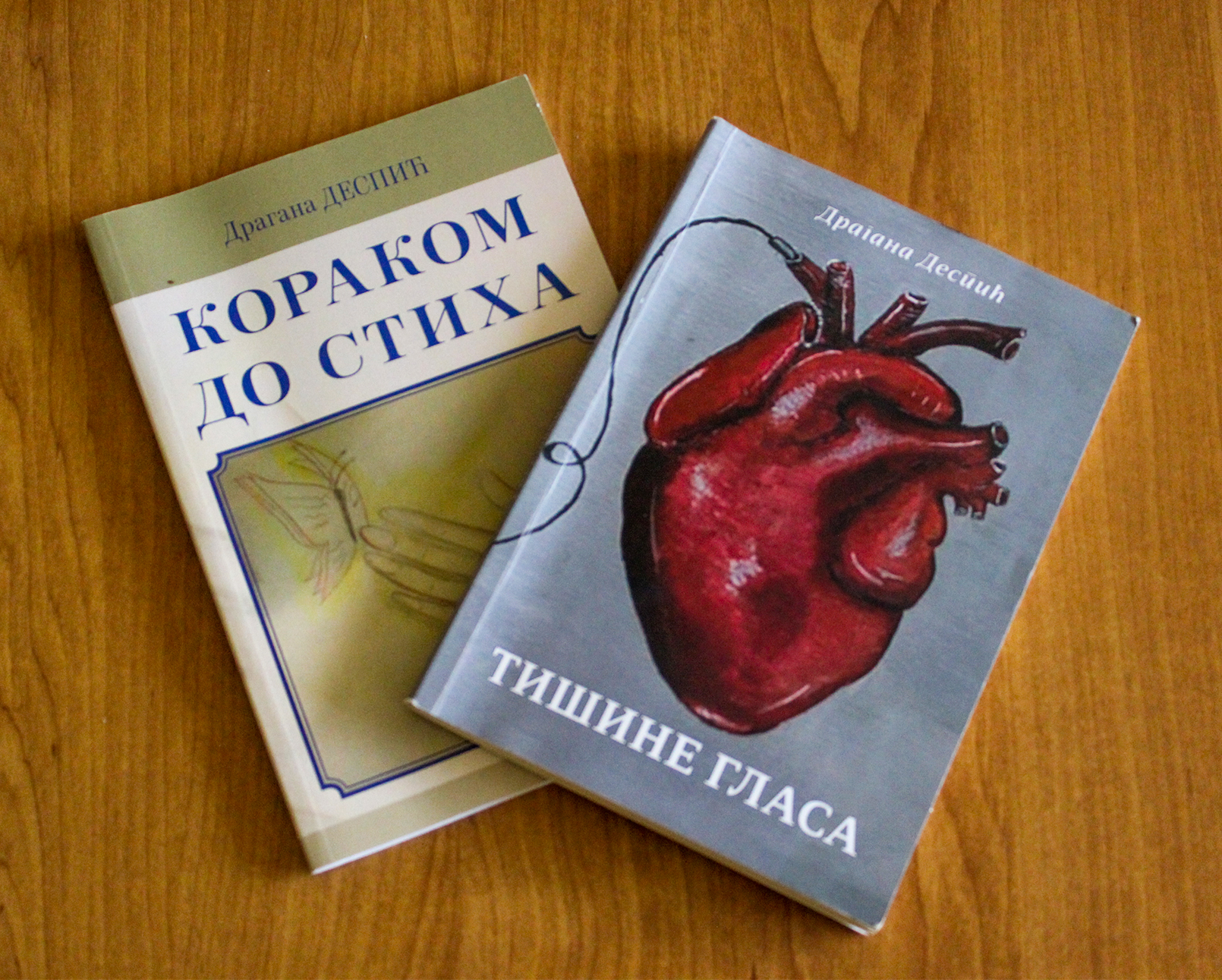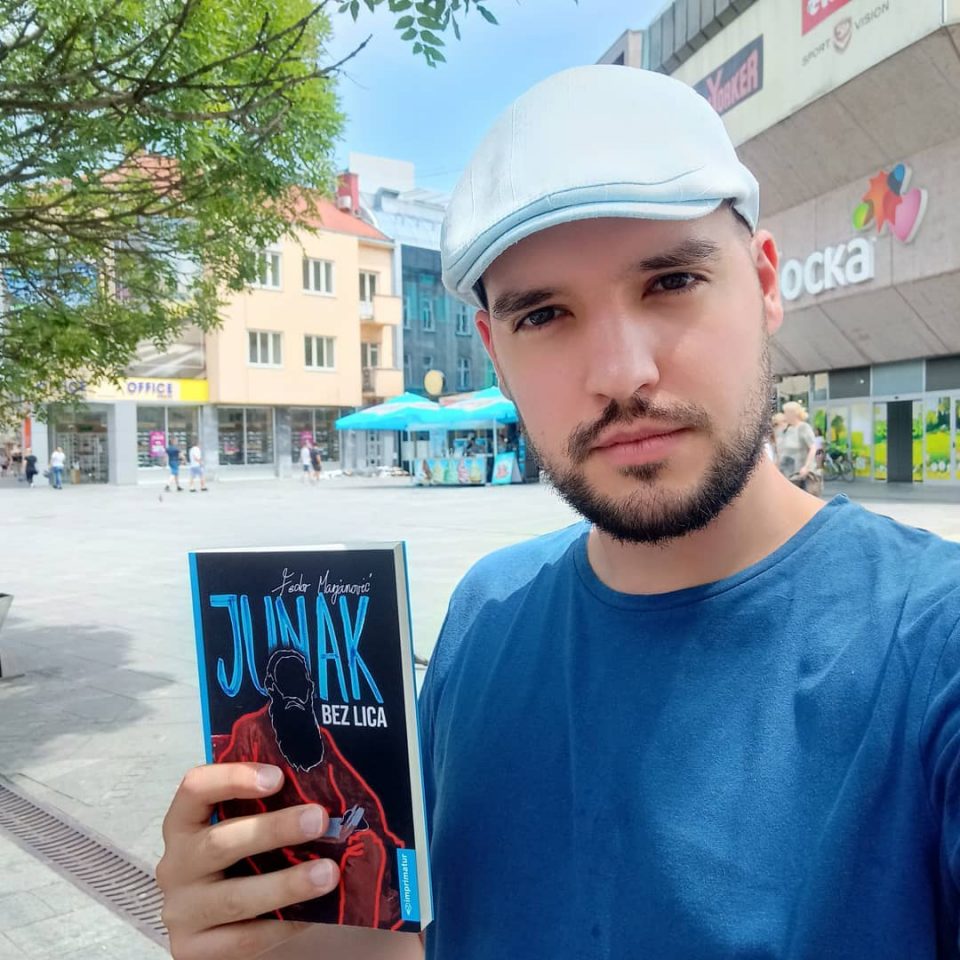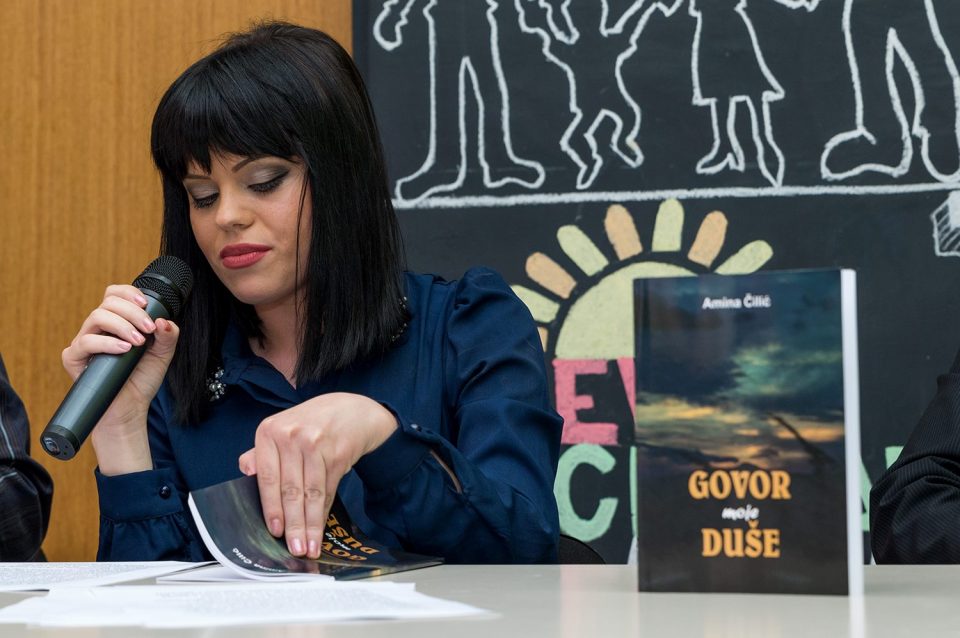
Although they come from different cities, four young writers share a great love for the written word. By their example, they show that literature in Bosnia and Herzegovina is not dying out.
With the arrival of the 21st century and the era of the internet and social networks, there was a significant decline in readership, especially among young people. According to research by the American Psychological Association (APA), only 20 percent of American teenagers read a book, newspaper, or magazine on a daily basis, while more than 80 percent use social media daily. There is no such data for Bosnia and Herzegovina, but one could reasonably expect that the findings would be similar.
Young writers from different parts of Bosnia and Herzegovina show that poetry and prose have not been forgotten; however, for writers, their position has become increasingly difficult.
“The very fact that you can’t make a living from writing in this country is devastating enough. There is no possibility for me to fully devote myself to work on my art, because I have to have a job I can live off of. In this case, both my work and my writing suffer,” said Fedor Marjanović, a young writer from Banja Luka.

Marjanović believes that the biggest motivations for writers are emotional and personal satisfaction, rather than material gain. Poets Dragana Despić from Teslić and Amina Čilić from Jablanica, as well as Ivona Grgić, a writer from Tuzla, agree with him.
“You can’t make a living from poetry, like from some work in the profession. I believe that poets shouldn’t strive so much for material wealth, because I’m of the opinion that no amount of money can buy the array of emotions summed up in one poem,” said Despić.
The twenty-five-year-old poet Amina Čilić speaks about the effect of poetry and literature in general on the human psyche and soul, and how books should be a part of our everyday life: “Simply by writing, I take that burden off my soul. And on days when I don’t have the inspiration to write, I turn to reading, and in that way, the therapeutic relaxation of my soul continues.”
Thirty-three-year-old Ivona Grgić gained the status of a Bosnian writer with humorous short stories in the book Muzej nostalgije [The Museum of Nostalgia], and verses from the collection Zapisi iz zjenica [Inscriptions from Pupils]. An extremely versatile person, she studied medicine in high school and went on to earn a degree in criminology. She speaks seven languages, and in just two years of writing, she has won thirteen esteemed literary awards. In addition to writing, she engages in agriculture and beekeeping. Interestingly enough, as she herself notes, she didn’t even know she had a talent for writing until she was thirty, and in that time, she has accumulated many stories to share with the world.

Muzej nostalgije was released in June 2021. As the title suggests, it is full of stories in which Ivona remembers her school days, mischief from her childhood, and her friends and loved ones from when she was growing up. From experience, Ivona has learned that childhood is a very important period in the life of every person and that nothing can compensate for a missed childhood; but in addition to love and attention, children need to be taught work ethic, so that they are ready to step into the adult world.
“Nothing can make up for a missed childhood, and in order to mature into a mentally healthy person, it is necessary to enjoy everything that a child should enjoy. However, childhood shouldn’t be all fun, play, and protection, interwoven with the words: ‘let them be, they are small, there’s time.’ Healthy habits should be developed from a young age,” said Ivona.
On the other hand, Ivona points out that today, times are much more challenging for children because of technological developments and social networks. Although the general availability of knowledge compared to earlier times has its advantages, it also entails much more complex forms of peer communication and opens up new dangers in the form of online abuse.
“To be honest, I’m a little envious of kids today. Knowledge is available to them at every turn. But at the same time, every media is a new form of fascism, so I feel sorry for kids, because they are subjected to much more colorful forms of violence than we were. I often wonder how I would deal with peer bullying if by some chance the internet had been available to everyone when I was their age,” Ivona mused.
Her grandparents had a special place in her life because of the selfless love they gave her, each in their own unique way. They were there to help, advise, and comfort her, and she learned a lot from them, so a significant number of stories in Muzej nostalgije are dedicated to her grandma and grandpa.
“For us, our grandparents were friends and educators. They were allowed to tell our parents to ‘get over it,’ and those who corrected us for the mistakes they made while raising our parents. I learned countless things from them, including old-fashioned words that my friends from the city were deprived of, which I gladly use in my stories today. I learned from my dad’s mom, whom I called baba, that I should amuse myself as much as possible and that a day without a good joke and laughter is a wasted day,” said Ivona.
Various motifs run through Zapisi iz zjenica, which was published at the end of 2021. The poem “Stih” [Verse] stood out in particular as a review of the problem of the still deeply rooted patriarchal culture in our society and the negative consequences for girls and women who grow up in patriarchal environments. At the same time, she points out that in the fight against patriarchal patterns of education, it is necessary to change the awareness of women themselves.
“It’s about wrong beliefs that put women in an inferior position. I also grew up with the phrase ‘if the floor isn’t swept and there’s a girl in the house, shame on you.’ As I grew up, the range of shame widened, so it was inconceivable that I, as a girl, would play soccer with a guy, while it was okay for me to help that same guy with math homework. Unfortunately, patriarchy is still alive today. I sincerely hope, because I am an incorrigible idealist, that one day, a generation of women will emerge that raises their sons not to feel superior to their wives or daughters or to anyone. So, without a change in women’s consciousness, there are no changes in women’s lives,” explained Ivona.
The captivity here
if you are a woman
is inherited like thin hair
which is a handful
only when you collect it
on the floor
…
You cook, little one
then when you want to play
some games
Something like Hide & Seek
You were taught to
close your eyes
while they
spoil your childhood…
(An excerpt from the poem “Stih,” in the poetry collection Zapisi iz zjenica by Ivona Grgić)
Ivona’s message to all those who write, as well as other young people, is: “First of all, don’t give up on your dreams, no matter what those dreams are, and secondly, read, even just a glance, because there is no writing without first reading.”
Twenty-four-year-old poet Dragana Despić has been writing poetry since her school days in Teslić, a town in Usora, known for the Vrućica Spa and its natural beauty. She completed her master’s studies at the Faculty of Organizational Sciences in Belgrade and is also working on a master’s in sociology at the Faculty of Political Sciences in Banja Luka, in addition to being involved in youth activism. She published her first collection of poems, Korakom do stiha [Step by Step to Verse], in 2017, while the second collection of poems, Tišine glasa [The Silence of Voice], was published in 2020.

She finds inspiration in everything that arouses her emotions, both the happy and beautiful, and the sad. Emotions are the main ingredient of her poetry, and she emphasizes love as the most common motif in her poems.
“If we single out love as the greatest virtue of the three basic virtues, it is indisputable that it is the greatest human responsibility, it’s what makes us human. It is enough to refer to Meša Selimović and with that, sum up all its meanings and definitions ‘One who misses love, will miss life,’” said Dragana.
Simultaneously working on two master’s degrees and being active in the youth sector in addition to writing poems requires good time management. Dragana believes that good organization requires self-discipline and constant effort, along with setting a goal that is realistic and achievable.
“I was taught time management by a sentence from a psychology book in the second year of high school, and it read something like this: ‘Success is the sum of small efforts repeated day after day.’ We can’t become organized overnight if we haven’t been organized previously. However, with constant practice or self-discipline, the organization of both time and work can become routine for us,” said Dragana.
According to the poem “Nemoj prljati sebe” [Don’t Pollute Yourself] from the collection Tišine glasa, the most important thing in life is to find peace of mind. The fast pace of modern life with tons of information coming from the Internet and social networks, and the general race of existence, pose great mental health challenges for people today. It is thus necessary for everyone to find something that relaxes them.
“‘Nemoj prljati sebe’ was created as a kind of self-admonition. It’s something you grow into, and whether you ever grow into it is a philosophical question. I also don’t think there’s any universal recipe for individual peace. Everyone has to find it for themselves. Some find it through music, some through sports, some through art, work, travel, and all of that is acceptable. It’s important to be aware of how much this is the only right way for every situation in life,” explained Dragana.
Do not pollute yourself,
with everyone’s company,
with words, with thoughts,
just turn around, walk away,
but never witness humiliation,
neither of yourself nor of others,
those are the important details,
let the heavenly eyes shine,
but pollute yourself,
not even in jest.
(Excerpt from the poem “Nemoj prljati sebe,” in the poetry collection Tišine glasa by Dragana Despić)
Her message to other young writers is to keep in the habit of writing, because paper can handle anything, unlike the human heart. As a unique message for all people, Dragana offers a stanza from her debut:
Paint high horizons with the brush of life
that we do not extinguish what is valuable in this moment
divide life into smaller lives
and invest in that which you do not want to collapse.
Junak bez lica [A faceless hero] is the name of the collection of short stories with which Fedor Marjanović introduced himself to the reading public in 2021. The thirty-one-year-old writer from Banja Luka has won several important prizes in literary competitions. He earned his degree in Serbian language and literature at the Faculty of Philology in Banja Luka and works as a high school teacher.
Fedor states that the basic value of literary works is in portraying people with all their virtues and flaws. The key is in confronting human nature, and in that confrontation, looking for answers to life’s questions and inner turmoil which are characteristic of every human being. Literature has the role of a certain catharsis, or purification, in all of this.
“What literature can offer us is a moment of recognizing ourselves, not as beautiful, perfect, self-helped aliens, but as beings with flaws. In ancient tragedy, one of the main goals was catharsis, I would say for both the hero and the audience. In this way, literature also offers catharsis by aestheticizing precisely those experiences with which we ourselves are familiar. You shouldn’t look to literature for answers, you should look for confrontation,” said Fedor.
In the short story “Neprijatelji” [Enemies], Fedor deals with the topic of domestic violence caused by the consequences of post-traumatic stress disorder. He describes the complexity of the problem and draws society’s attention to the importance of mental health care and not ignoring such topics or pushing them under the rug.
“What I tried to show in this story is the way in which the war destroyed both our generation and the generation of our fathers. Some are primary and others are secondary victims. On the one hand, there are men who have to kill each other because of some imaginary narrative, and on the other hand, there are half-grown young people who want to get closer but carry the burden of hatred left by their fathers, as well as life in a destroyed country. The bottom line is that all of this will remain within us, even when we think we have freed ourselves from it,” explained Fedor.
In the short story “Politička karijera pjesnika Aleksandra Maksimovića” [The Political Career of the Poet Aleksandar Maksimović], this young writer dealt with another significant problem in Bosnian society, which especially affects young people, and that is unemployment and securing a livelihood. The story describes the existential and life struggle of a young man who becomes a member of a political party for reasons of employment, but feels that he is losing his dignity. He goes to party meetings with a feeling of disgust, blending into a faceless mass of those with dubious levels of intellect and integrity, wondering what the meaning of everything is.
“The story is more intended as a satirical representation of society. On the one hand, the protagonist is forced to join the party to get a job, and on the other hand, he himself is not ready to take any action that would lead to change. He is both a tragic and a comic figure. A person who wants to do a lot, but is very passive. The end shows his mental breakdown as he turns into some kind of monster. Of course, that is not the solution that I propose, it is more of a warning of what will happen,” Fedor pointed out.
He advises the young people in Bosnia and Herzegovina to fight: “I don’t think I am in a position to send instructive messages, because I myself am looking to find my own path, just like my heroes. I don’t plan to give up, because I realized that I couldn’t live without writing, but to be able to do it completely freely, I have to fight for my space. Well, that would actually be a message to young people – Fight.”
Twenty-five-year-old poet Amina Čilić comes from the other end of Bosnia and Herzegovina, from the town of Jablanica. She is the author of the collection of poems Govor moje duše [Discourse of my Soul] published in 2016, and she is announcing the publication of her other collections soon. She works as a journalist for the Novikonjic.ba portal.

Most of the poems from Govor moje duše are imbued with themes of love. Amina states that love is her greatest inspiration, and that love itself is an inexhaustible source of inspiration for every form of art.
“Whether they are happy or unhappy, many loves end up on paper, for all time, or on screen or film. I don’t believe that you only love once in your life, but I really believe that there is that one love that makes life more valuable, more complete. Because of that one, others seem so small to us, even though they were once the biggest in the world,” said Amina.
In the poem “Jednoj ptici” [To One Bird], Amina reveals that she would like to have the power to fly so that she can visit the far away vastness, because only birds are truly free beings without limitations and shackles.
“Yes, I would love the gift of flight. Normally, I’m a person who likes to travel and discover as many new places as possible, and discovery would be much easier that way. Wouldn’t it be nice if we could always hug those we want, but who are far away? To be with them in an instant, without having to worry about how much money is in our account. It would be enough to love and go there,” added Amina.
Oh little bird,
if only you knew
how lucky you are
that you can fly.
In one day you see,
everything I dream about.
Tell me what is behind that hill,
I would like to know.
…
So fly, where love is waiting for you,
visit the vastness of far away.
(Excerpt from the poem “Jednoj ptici,” in the poetry collection Govor moje duše by Amina Čilić)
With the lines “Be the hero of your own story, nobody else’s should concern you,” she says that you should walk through the path of life without prejudice and judgment, because no one knows what it’s like to walk in another person’s shoes. Simply live and let live.
“We would all be happier if we didn’t cross the boundaries of others’ privacy so much and if we didn’t give ourselves the right to judge others. In the role of judge and interpreter of other people’s actions, we are all the best, and life can very easily teach us the difficulty and senselessness of that.”
Amina tells young people to believe in themselves: “No matter how much your environment limits you and convinces you that you can’t do something or that something is not for you, try to prove the opposite. Because you can do that. And never let their imposed limitation become your limitation. I would only tell those who write to do it with love and not to forget to leave a part of their soul in every printed page. Because that is what leaves a mark on people.”






